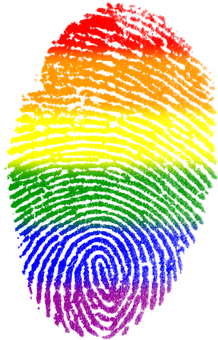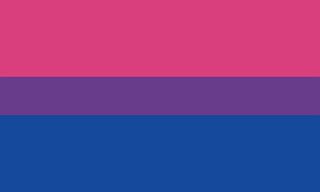Health
Why Are Mental Health Issues Greater Among Bisexual People?
New research offers new insight into troubling findings with bisexuality.
Posted April 25, 2019

Research with LGBTQ populations has, for many years, uncovered challenging data regarding bisexual people. They experience emotional difficulties and anxiety, at higher rates than both heterosexuals and homosexuals. Across their lifespan, bisexuals demonstrate less of an increase in life satisfaction. Bisexuals are, as a group, least likely to be “out” to friends, families, and coworkers, and are less likely to participate in Pride events or to boycott businesses based on LGBTQ bias. (I've covered many of these findings here).
Researchers have more difficulty finding bisexuals to participate in studies compared to other sexual minorities. This is typically attributed partly to the lower rates of “outness” in bisexuals. There may be differences in these factors with male and female bisexuals, as male bisexuals frequently report experiencing greater stigma for their bisexuality.
New research published in the Australian Journal of General Practice reviews results of the “Who I Am” survey of 2,651 Australians who identified as bisexual. The study examined their bisexual identity, their current relationship characteristics, their feelings about their bisexuality, and their mental health. The study replicated many historical findings—and demonstrated staggering levels of emotional struggles. A majority of the sample, 58%, reported either high or very high levels of psychological distress, with histories of anxiety, depression, and eating disorders the most common reported diagnoses. And 67% reported they had been diagnosed with mental illness by professionals. Almost half of the respondents disclosed self-harm or thoughts about suicide within just the last two years. More than one in four (28%) had attempted suicide in their lives and 78% had thought about it.
But the study also found some compelling results that help us to understand the contextual nature of how bisexuality may interact with mental health and life satisfaction issues.

First, bisexuals who had higher levels of internalized “biphobia” were unhappier, as a group. This makes sense, as this disposition—measured by questions such as “Do you ever feel that your sexuality is bad or wrong?”—reflects people’s sense of dissatisfaction with their bisexuality. In other words, it’s likely these individuals wished they weren’t bisexual, wished they could make their bisexual feelings and attractions go away, and felt that their bisexuality was a problem in their lives.
Secondly, and perhaps most importantly, bisexuals who were currently in a heterosexual relationship, and especially those who were in a heterosexual relationship with a partner who was not accepting of the respondent’s bisexuality, were also much more prone to disclose mental health difficulties and general psychological distress. These were bisexuals struggling with being unable to express their bisexuality, perhaps attempting to suppress or contain their same-sex attractions, who felt that their primary partner wished they were not bisexual.
Interestingly, results did not find that having LGBTQ peers and friends was related to lower levels of biphobia or unhappiness. This is an important finding, as many clinicians such as myself often try to help such bisexuals by helping them develop a supportive and accepting peer group. This intervention may be ineffective if there are no changes to the support and acceptance offered by the primary heterosexual partner.
There are some limitations to this study that we need to consider. First, it is correlational, and thus we cannot determine causality. For example, it is possible that bisexuals with higher self-hatred and unhappiness are more likely to choose a heterosexual relationship with someone who doesn’t accept their bisexuality. Perhaps bisexuals with lower levels of internalized biphobia are less willing to accept and stay in an intimate relationship where they are not accepted.
Secondly, the study didn’t distinguish whether there were differences by gender. Gender was controlled in the analyses, and if there were gender differences in these effects, it’s not apparent in the results. As mentioned above, there are gender differences in bisexual stigma. I also would love to know how religious or spiritual these individuals or their partners are, given so much growing data about the relationship between religious sexual values and feelings of psychological distress related to one’s sexuality.

Finally, the study allowed people to self-identify as bisexual, without further detail. In one famous study, self-identified male bisexuals did not demonstrate a bisexual arousal pattern, but when follow-up research was done with males who had sex with both males and females within the prior year, a bisexual arousal pattern was evident. So, self-identified bisexuals may not be reflective of all bisexuals. My colleague Simon LeVay, who has held past positions at Harvard, Salk and UC San Diego, has published extensively on issues related to neuro-anatomy and sexual orientation. He suggested the following to me, though he clarified that this is unlikely to be a complete explanation:
“I can offer a partial explanation for why the 'bisexual' individuals in this study were especially unhappy in opposite-sex relationships…when 'bisexual' men are loosely defined, they turn out to be much more aroused to one sex (usually to males) than to the other. The bisexual participants in this study were certainly loosely defined. Therefore, it seems likely that many of the 'bisexual' men in opposite-sex relationships were having sex with partners of their non-preferred or less-preferred sex -- which would be enough to make anyone unhappy. I don't know of equivalent findings for women, so this explanation is likely to be only relevant to the men in the study, who were in the minority.”
So, this new study suggests that people who identify as bisexual are at greatly increased risk of struggling with emotional issues in their lives, suffering from depression and anxiety. They should be considered at extremely high risk for suicide and thoughts of self-harm, and they deserve effective, compassionate, and affirmative support on these issues. But in addition to treating the symptoms of these conditions, it is essential that clinicians approach bisexuals with an examination of how they feel about themselves and their bisexuality, and that we consider their relationship and partner.
Helping bisexuals to examine why and how they feel about their bisexuality may offer room for education and exploration of the development of new, affirmative sexual values. Reducing internalized biphobia might decrease the risk for self-harm and emotional distress. But if a bisexual person is in a relationship with a partner who rejects their bisexuality, they may remain unhappy. To reduce unhappiness and risk, either the relationship or the partner’s attitudes towards bisexuality may also need to change.




